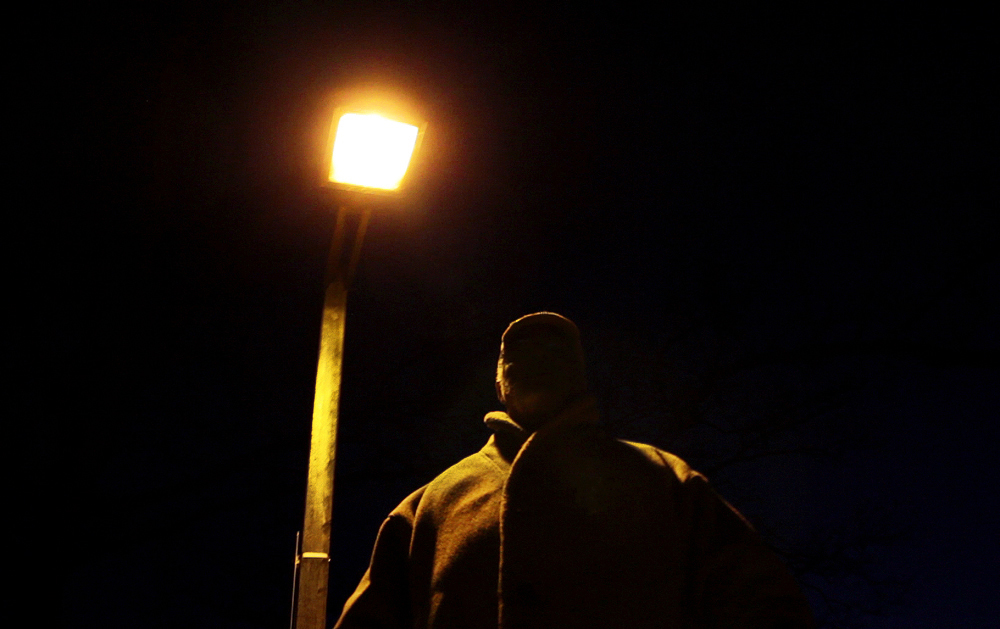You know Lyric Cabral and David Felix Sutcliffe’s “(T)error” is going to be something special when the tantalizing premise that’s advertised in the festival program notes almost immediately becomes of less interest than the incredible character that they’ve found in Shariff, a former Black Panther who aspires to open a bakery that makes specialized cupcakes. We first meet Shariff at his son’s basketball game, far more ebullient than the middle school-aged players on the court, not even bothering to take off his chef’s smock to wildly cheer on the team and dance like there’s no tomorrow on the sideline. You soon discover he also happens to be an FBI informant.
The fact that Cabral and Sutcliffe don’t make this revelation feel as if they’re pulling the rug out from under you speaks to both the confidence and depth of their exceptional film, a ferociously entertaining yet sobering look at the surveillance state of America and the potential overreach of the powers that be in seeking out those they believe to be terrorists. As a Muslim, Shariff has an in with the kinds of people the FBI has targeted as potential terror threats and in return, Shariff can make ends meet since as he notes, no one else is looking to hire someone of his age. However, while no explicit link is made by the directors, it isn’t a leap to believe that as Shariff’s payments start to wane, so does his secrecy about what he does, which is why Cabral and Sutcliffe are given extraordinary access to an ongoing investigation. Cameras follow Shariff from Brooklyn to Pittsburgh where he is dispatched to find out more about a man named Khalifah, a Caucasian convert to Islam who posts anti-government rants on Facebook and YouTube. The film’s stark white intertitles is quick to point out the FBI is unaware that Shariff has invited the camera crew.
The fact alone that a middle-aged man with no proper training and little deference to the government agency he’s serving is being shipped to Pennsylvania and paid like a bounty hunter to gather intel on Khalifah is surreal enough. But far more so is what happens after Shariff arrives in the Steel City, raising all kinds of troubling questions about how the FBI identifies terrorist suspects and go about building cases against them, often based of evidence that’s specious at best. As Shariff’s befriending of Khalifah occurs in the present, Cabral and Sutcliffe delve into the informant’s past, from how he went against the very tenets of the Black Panthers to work clandestinely for the FBI to ultimately playing a role in putting a jazz musician named Tarik Shah, now serving an 18-year stretch after being recorded pledging his devotion to Al Qaeda though an informant posing as a member. Brilliantly edited, the film gradually introduces new perspectives into the mix to augment Shariff’s increasingly disillusioned point of view, showing how a flawed process has likely resulted in creating more victims than security.
Not that Saeed needs accompaniment to be contradicted. Reminded by the filmmakers that he agreed to be on camera, he complains at one point, “Now, I know why celebrities don’t like the paparazzi” when he insists on not having any direct headshots. In doing so, he inadvertently contributes to a novel aesthetic for the film where its subjects often appear out of focus or just to the right or left of the frame, even when they’re relaying their own story as if their control of it has been given to someone else. (The two directors, working as their own cinematographers, get one striking image after another.) Surely some luck contributed to just how ridiculous the pursuit of Khalifah gets, with Shariff initiating conversation about terrorist ties by suggesting he watch “Homeland” and Khalifah, who Shariff seems to aptly describe as “not the smartest, but also not the dumbest, either,” beginning to figure out something’s amiss with this guy he just met. But Cabral and Sutcliffe appear to have made much of their own, following the story wherever it leads and more impressively, putting it in a greater context.
“(T)error” was made under the watch of executive producer Eugene Jarecki (“The House I Live In”) and creative consultant Laura Poitras (“Citizenfour”) and while it’s distinctly its own entity, it shares a propulsive narrative drive, a journalistic thoroughness and even a slightly warped sense of humor with the best of their work. One can’t help but marvel with incredulity at the text message conversations recovered by Cabral and Sutcliffe that show Saeed’s flip interactions with the Bureau or Khalifah’s surprising wherewithal to turn the situation on its head. But the duo never lose sight of the true cost of this craziness, a war waged on American soil with little rhyme or reason that’s everywhere and nowhere at once, making a film that no matter what your experience, will hit you right where you live.
“(T)error” does not yet have U.S. distribution. It will play three more times at the Tribeca Film Festival at the Bowtie Cinemas Chelsea on April 21st at 9:15 pm, April 23rd at 6:45 pm and April 24th at 3:15 pm.




